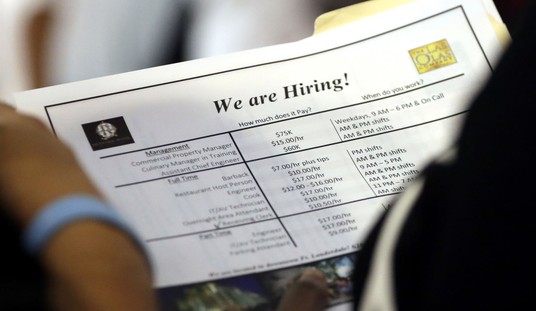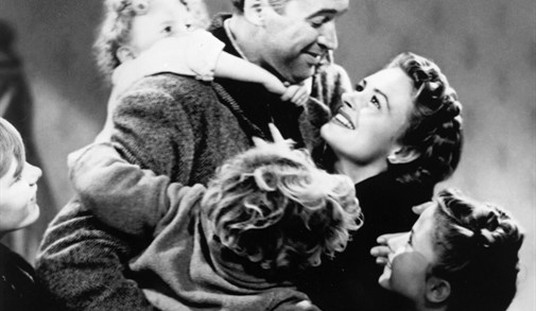Claremont Review of Books is the “brainiest and best” among conservative publications, I’ve claimed previously on this page, and it is a privilege to contribute. The new issue has must-read essays by Charles Kessler on Trump in 2020 and Michael Anton on draining the swamp. It also presents my review-essay on a landmark edition of the Pentateuch in five volumes, with thousands of explanatory notes by the leading Orthodox Jewish authority of the 20th century, Rabbi Joseph Soloveitchik. He is known to Christian readers through his essay “The Lonely Man of Faith.” This magisterial work fairly might be called the insider’s guide to the Hebrew Bible. Clarement Review has generously unlocked the article for a limited time as a courtesy to PJ Media readers.
I’m what we Jews call a “ba’al teshuvah,” a “returnee,” that is, observant later in life. I was brought up in a secular home and remained an atheist until my mid-30s. Not until the age of 40 did I attend synagogue weekly. Ten years ago I joined an Orthodox synagogue and became observant, after I encountered the work of Rabbi Soloveitchik. Reading the first pages of his book And From There You Shall Seek I fell off my chair–literally. I suppose one would call it a conversion experience.
Now we have an edition in five volumes of the Five Books of Moses with thousands of annotations drawn from Soloveitchik’s years of lectures on the weekly Pentateuch portion and other writings. It is the first Orthodox presentation of the Hebrew Bible that will interest a broad audience. I study it every week to prepare for the Torah reading on Sabbath. After twenty-five years of reading the whole of the Pentateuch in synagogue each year, Soloveitchik’s commentary has shown me how to read the Bible in an entirely new way.
What we today call Modern Orthodoxy–observant Judaism that engages the knowledge and culture of the West–is in many respects the product of Soloveitchik’s forty-year teaching career at Yeshiva University, where he ordained more than 2,000 rabbis. As a teacher of traditional sources he was a prodigy, but he also mastered the corpus of Western philosophy, including foundational issues of mathematics and science. He urged religious Jews to engage Western philosophy from the critical distance of Jewish tradition, and draws on the thought of philosophers from Kant to to elucidate Jewish ideas. The result, I argue in the CRB review, is an “original phenomenology of religious consciousness.” In an article for the Jewish scholarly journal Hakirah I tried to explain Soloveitchik’s “new world view.”
Here is an excerpt from my review:
Two leading themes recur throughout the commentary: God’s summoning of “majestic” man to partnership in creation, and God’s consoling of “covenantal” man in his humility and distress. These ideas are well grounded in Scripture and classic Jewish sources. Soloveitchik adds a new dimension—an original phenomenology of religious consciousness.
Soloveitchik observes, for example, that the first commandment God gave the people of Israel as they prepared to leave Egypt “was to mark time” (Exodus 12:12):
The Lord spoke to Moses and to Aaron in the Land of Egypt, saying, “this month shall be to you the head of the months, to you I shall be the first of the months of the year.” Freedom arises from the creation of time: “The slave lacks time experience. To the slave, time is a curse; he waits for the day to pass. The slave’s time is the property of his master…. Life, to the slave personality, is motionless. To live in time means to be committed to a great past and to an unborn future. Time-awareness also contains a moral element: responsibility for emerging events and intervention in the historical process. Man, according to Judaism, should try to mold and fashion the future. That is exactly why he has been created as a free agent.
Time-awareness, the Rav explains, has three components: “First, retrospection; without memory there is no time. Second, the exploration or close examination of things yet unborn and the anticipatory experience of events not yet in being. Third: appreciation or evaluation of the present moment as one’s most precious possession.” Christian readers will note the similarity of Soloveitchik’s presentation of time to Augustine’s in Confessions, Books XI-XIV, but there is an important difference. Augustine believes the past is gone, the present is insubstantial, and the future has not arrived. “What, then, is time? If no one ask of me, I know; if I wish to explain to him who asks, I know not.” Time, for Augustine, is a paradox. In contrast, for Soloveitchik, man is himself a creator of time by virtue of being God’s partner in creation. Memory is not simply the imprint of past events, but a willful act of reconstruction. The commanded act of making a calendar that commemorates the Passover in perpetuity begins this act of reconstruction. The future is not a point on an infinite horizon, but the self-created destiny of God’s people in its journey to redemption.
Readers who puzzled over the sacrificial service of ancient Israel will find deep insights into its religious and psychological significance. Here is one striking example among many, about the casting of lots over two goats on the Day of Atonement, Yom Kippur: One goat to be sacrificed to the Lord, and one “scapegoat” sent to the Wilderness:
There is a profound idea behind the casting of lots in this ritual of atonement. The penitent argues that his moral directions were influenced by forces beyond his control, that his sinning was not entirely a free and voluntary choice. The Almighty can evaluate the extent of human culpability in situations that are not entirely of man’s making. Only God knows to what extent a man was a free agent in making his decisions. The casting of lots is thus a psychodramatic representation of the penitent’s state of mind. The compelling intrusion of the unknown and irrational is basic to man’s existential condition, and his weakness in the face of such intrusion qualifies him to reserve God’s compassionate forgiveness on Yom Kippur. Only by entering such a plea can man be declared not guilty.
The mists that hide the ancient Jewish past from modern eyes dissipate before Rabbi Soloveitchik’s penetrating gaze. No work I know brings ancient Israel to life in such a vivid way, or shows how the practices of the Hebrews in the time of Moses are of urgent relevance to the human condition today. If you want to know what it was like to be Abraham, or Jacob, or Moses, this commentary is for you. It will change the way many Jews read the Bible, and Christians, as well.
Read the whole review here. And please subscribe to the Claremont Review of Books, the only conservative publication I read end-to-end every issue.










Join the conversation as a VIP Member